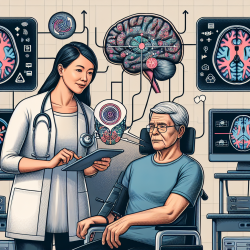In the field of speech-language pathology, making data-driven decisions is paramount to achieving the best outcomes for children and adults alike. The recent study titled "Effects of a new speech support application on intensive speech therapy and changes in functional brain connectivity in patients with post-stroke aphasia" offers compelling insights that can help practitioners refine their approaches to speech therapy. This blog aims to translate these research findings into practical strategies for enhancing therapeutic outcomes.
Understanding the Study
The study investigated the impact of a newly developed speech support application on language and cognitive functions in patients with chronic post-stroke aphasia. The researchers used resting-state functional MRI (rs-fMRI) to examine changes in brain connectivity before and after the intervention. Two patients participated in the study, undergoing intensive speech therapy using the app for eight consecutive weeks.
Key Findings
- Both patients showed improved pronunciation, daily conversational abilities, and attention functions.
- rs-fMRI analysis revealed increased functional connectivity in brain regions associated with language and attention.
- The speech support app facilitated improvements in language functions even in the chronic stage of stroke.
Implementing the Findings in Practice
Practitioners can leverage these findings to enhance their therapeutic strategies:
- Incorporate Technology: Utilize high-tech tools like the speech support app to provide intensive, consistent therapy sessions. These tools can be particularly beneficial for patients who have limited access to face-to-face therapy sessions.
- Focus on Intensive Therapy: Short-term, intensive therapy sessions have shown significant improvements in language functions. Practitioners should consider incorporating intensive therapy periods into their treatment plans.
- Monitor Cognitive Functions: Beyond language improvements, the study also noted enhancements in attention functions. Regular assessments of cognitive functions can help tailor therapy sessions to address multiple areas of need.
- Encourage Independent Practice: The app's design allows patients to engage in speech therapy independently, providing flexibility and promoting consistent practice outside of scheduled therapy sessions.
Encouraging Further Research
While the study's findings are promising, the sample size was small. Practitioners are encouraged to contribute to further research by implementing similar interventions and documenting outcomes. Larger, longitudinal studies will provide more robust evidence and potentially lead to the development of even more effective therapeutic tools.
To read the original research paper, please follow this link: Effects of a new speech support application on intensive speech therapy and changes in functional brain connectivity in patients with post-stroke aphasia.










